

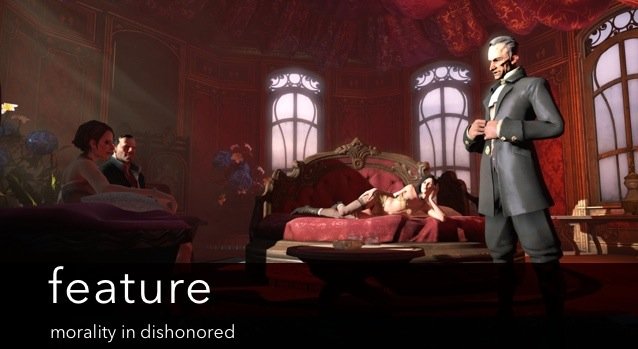
It's probably worth starting with two points, the first is that I'm going to talk in specifics about some of the content of Dishonored. That's kind of the purpose of this. Expect spoilers if you're concerned about ruining the very minor concessions the game makes toward including a plot. The second point is that Dishonored is a game that I liked a great deal but was largely underwhelmed with. It's an excellent experience that harkens back to games like Thief and Deus Ex, but ignored what made those games genuine masterpieces.
I could talk about why it isn't as good as Thief — maybe I will in another piece — but what grates on me most is that it takes Deus Ex's mutlilayered level traversal dependant on your personal play style, but not the multilayered narrative traversal dependant on your personal appreciation of the events you've been exposed to. They're similar games in great deal of respects. You've an array of superhuman abilities, you perform tasks without knowing the full consequences, you... have a crossbow?
What Deus Ex does that Dishonored eschews is it offers a far greater impetus on the player in following their own moral compass. Deus Ex is a game with moral choices, but they aren't binary. They don't have a cut and dry Devil Horns or Halo logo next to the text options. More importantly, the game's systems don't get in the way of you making your own decisions about what is right and what is wrong. It lets you develop your own reason why you believe what you're doing in a situation is best. The clearest example I can offer is when, in Deus Ex, you are charged with executing a man, but you can easily decide instead that you need to hear more of what he has to offer later and walk away, or even kill your partner AI giving the order. These will each have narrative consequences, but they're based solely on you, not on measuring whether either of these is correct.
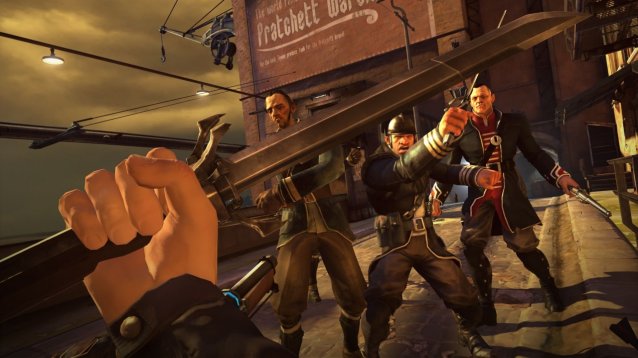
Dishonored includes the options of lethality or pacifism, but the interactive story choices it offers are paltry in comparison to Deus Ex's. The decision not to kill doesn't come from a matter of respect for the characters you're put up against, it actively goes against the game's own internal logic for why you're attempting to get rid of them. You were framed for murder as an attempt for the actual perpetrators to gain control of the city. They are clear and irrefutably bad people. Seemingly the decision not to kill anyone comes from an interest in putting them in positions that are worse than death. Forced exile, mute slavery, kidnapping by a jilted suitor. Except, there's one moment where your alternative moral choice is to essentially steal a man's wallet. This isn't an instance of dispensing greater moral justice. You aren't causing him a greater deal of suffering than had you killed him, you're causing him to not be able to buy lunch.
Right from the start of Deus Ex you can decide that the perceived enemy organisation is correct in their beliefs and make a conscious choice not to kill anyone within it, but fully appreciate the necessity of killing other factions whom you disagree with. You choose when killing is appropriate. Dishonored decides for you that enough killing will cause the world to descend further into chaos and - with a complete disregard for immersion — flat out informs you that the ending won't be as nice.
What's most important about this, as a result, is how the game handles the issue of euthanasia. If I could assume that this was a personal decision on the part of the developers I'd applaud them for trying to put a controversial point across in a massively budgeted piece of entertainment, but instead it feels simply like a game's mechanics working to the detriment of my moral compass.
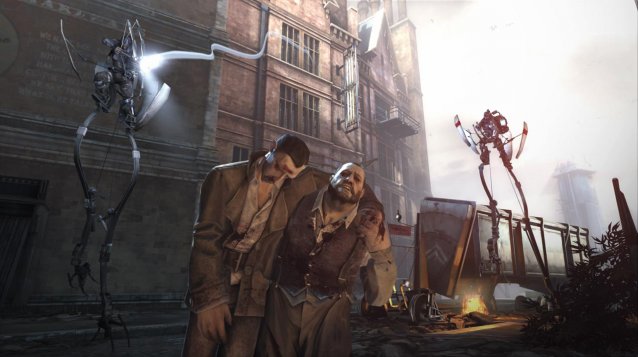
There are enemies called "weepers". People infected by the Dishonored's plague which serves as a backdrop to the events of the game. It's established early on that succumbing to this illness results in agony and an assured death.
I played a mostly non-violent play though, and I say mostly, because if i saw a weeper I would kill them and wouldn't hesitate.
I saw these as people in suffering. People that would die anyway and needed to be expedited to it. It was mercy. It was even displayed as something noble that happens between two of Dishonored's enemy NPCs. One is infected with the plague and asks the other to kill him before his symptoms progress further, wanting to avoid bleeding from his eyes and vomiting profusely, becoming needlessly aggressive to even his greatest friends. He made a decision to opt out early.
I took this to heart. I sided with these two characters. I wouldn't want anyone to have to live through that a second longer than they'd already lived through. Killing them seemed like a mercy. There was no cure. They weren't getting better. They needn't carry on.
Dishonored's mechanics disagreed.
Killing a weeper is still counted in your kills for that mission and will add to the game's chaos meter, a bolted on way of surfacing how the world will change around you based on your actions. It's an instance of mechanics getting in the way of my perceived understanding of the world. How will these mercy killings possibly add to the "chaos"? What panic will come of hearing about the man who will make sure you no longer have to suffer if you fall prey to the disease? Surely that would make for a lessened impact on the world?
It seemingly comes from designers not thinking the system through or just not considering it, but it's a result of what happens when we try to make black and white distinctions. The only true way to do player choice and the eventual fallout correctly is to offer choices that are horrible either way or to not arbitrarily decide for the player what the best way to act is. It's disrespectful, it's even misunderstanding the strengths of the medium. In video games I can make any choice I want for any reason I want. I shouldn't be punished for thinking outside limited and arbitrary options.
It's a minor part of the game and doesn't fully distract from what Dishonored's strengths are, but it's certainly indicative of its major faults. It's a game that contains a lot of content, but certainly not some that's been thought through to a great extent.
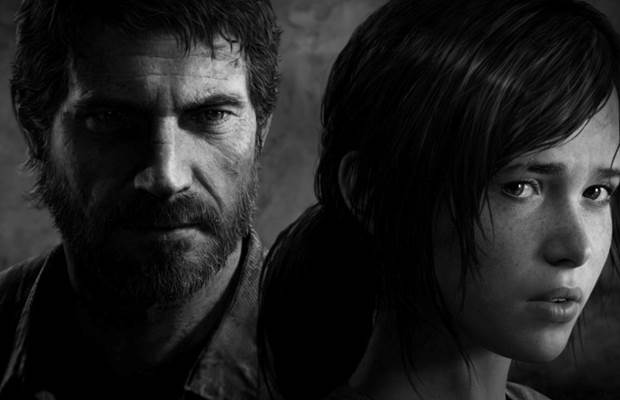
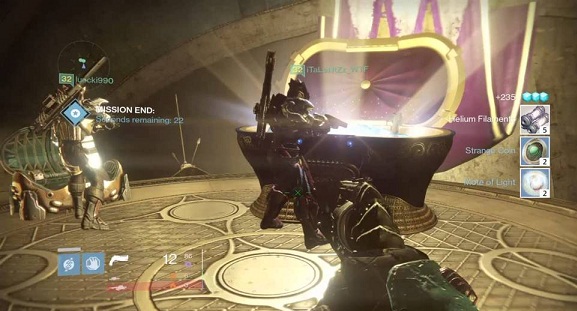

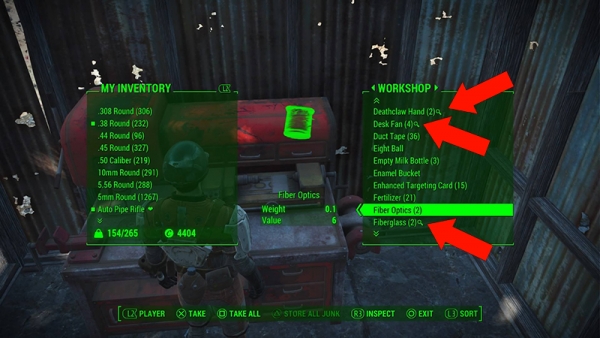
 Stunning PS4 Game Cases, Which Concepts Do You Like?
Stunning PS4 Game Cases, Which Concepts Do You Like?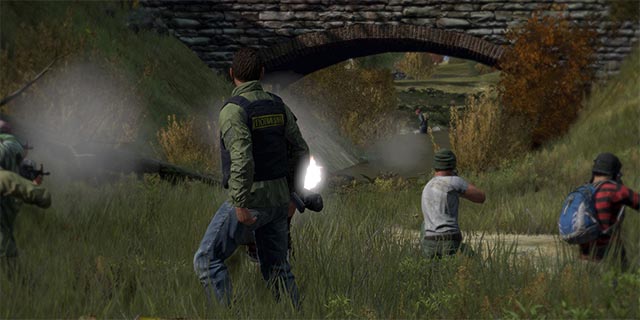 Play It Your Way: 4 Sandbox Games That Reign Above the Rest
Play It Your Way: 4 Sandbox Games That Reign Above the Rest Having Problems With Audio in Windows 10? Here's a Likely Fix
Having Problems With Audio in Windows 10? Here's a Likely Fix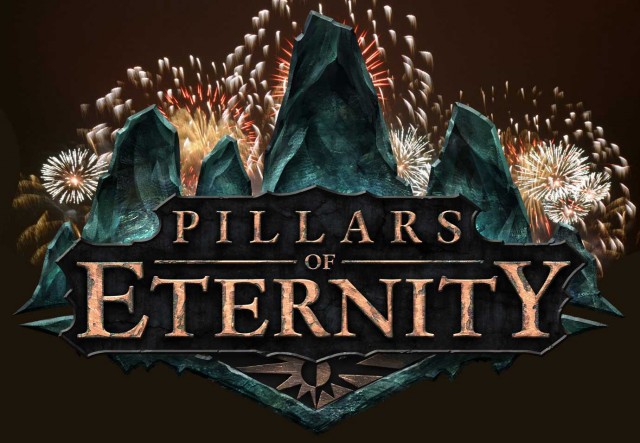 Steps to use Custom image in Pillars of Eternity PC
Steps to use Custom image in Pillars of Eternity PC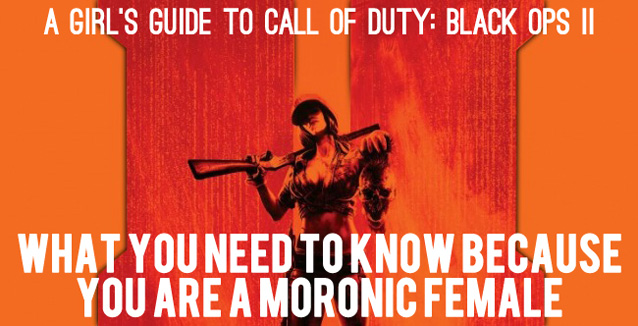 A Girls Guide to Call of Duty: Black Ops II — What You Need to Know Because You Are a Moronic Female
A Girls Guide to Call of Duty: Black Ops II — What You Need to Know Because You Are a Moronic Female